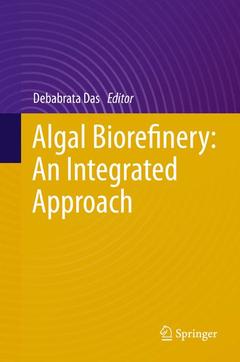Algal Biorefinery: An Integrated Approach, 1st ed. 2015
Coordonnateur : Das Debabrata

This book critically discusses different aspects of algal production systems and several of the drawbacks related to microalgal biomass production, namely, low biomass yield, and energy-consuming harvesting, dewatering, drying and extraction processes. These provide a background to the state-of-the-art technologies for algal cultivation, CO2 sequestration, and large-scale application of these systems.
In order to tap the commercial potential of algae, a biorefinery concept has been proposed that could help to extract maximum benefits from algal biomass. This refinery concept promotes the harvesting of multiple products from the feedstock so as to make the process economically attractive. For the last few decades, algal biomass has been explored for use in various products such as fuel, agricultural crops, pigments and pharmaceuticals, as well as in bioremediation. To meet the huge demand, there has been a focus on large-scale production of algal biomass in closed or open photobioreactors. Different nutritional conditions for algal growth have been explored, such as photoautotrophic, heterotrophic, mixotrophic and oleaginous.
This book is aimed at a wide audience, including undergraduates, postgraduates, academics, energy researchers, scientists in industry, energy specialists, policy makers and others who wish to understand algal biorefineries and also keep abreast of the latest developments.
1. Introduction
2. CO2 Sequestration through Algal Biomass Production
3. Growth Characteristics of Different Algal Species
4. Perspectives on Algal Engineering for Enhanced Biofuel Production
5. Photobioreactors for Improved Algal Biomass Production: Analysis and Design Considerations
6. Scale-up Problems for the Large Scale Production of Algae
7. Large Scale Algal Biomass (Spirulina) Production in India
8. Improvement of Harvesting Technology for Algal Biomass Production
9. Prospect of Marine Algae for Production of Industrially Important Chemicals
10. Recent Developments on Algae as a Nutritional Supplement
11. Engineering Spirulina for Enhanced Medicinal Application
12. Algae as a Source of Phycocyanin and other Industrially Important Pigments
13. Liquid Fuels Production from Algal Biomass
14. Gaseous Fuels Production from Algal Biomass
15. Integrating Microalgae Cultivation with Wastewater Treatment for Biodiesel Production
16. Significance of Cyanobacteria as Inoculants in Agriculture
17. Role of Microalgae in Microbial Fuel Cell
18. Remediation of Domestic and Industrial Effluents Using Algae
19. Bioremediation of Toxic Metals Using Algae
Index
Explores algal biofuels (3rd generation biofuels) and related, emerging technologies
Identifies core challenges and prospects of algal bioremediation
Represents all aspects of the concept of algal biorefinery
Provides a platform to discuss the wider scope of algal research
Date de parution : 12-2015
Ouvrage de 467 p.
15.5x23.5 cm



